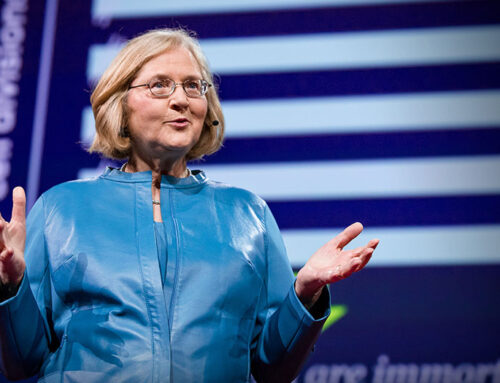Social Entrepreneur
Stephanie Shirley was born in 1933 as Vera Buchthal in Dortmund, Germany. Her Jewish father was a judge but lost his post to the Nazi regime. In 1939 Shirley (aged five) together with her nine-year-old sister, was sent to Britain as a Kindertransport child refugee and placed in the care of foster parents living in the Midlands.
At the age of 18, she became a British citizen and changed her name to Stephanie Brook. In the 1950s, she worked at the Post Office Research Station, building computers from scratch and writing code in machine language. Stephanie took evening classes for six years to obtain an honours degree in mathematics. In 1959, she moved to CDL Ltd, designers of the ICT 1301 computer.
After marrying physicist Derek Shirley in 1962, she founded a software company called Freelance Programmers with a starting capital of £6.
Having experienced sexism in her workplace, “being fondled, being pushed against the wall”, she wanted to create job opportunities for women with dependants.
In the austerity of post-World War II England, jobs were few, and opportunities for women to earn a wage were even fewer. So, on her dining room table, Stephanie founded the kind of company she’d like to work for – one that posed challenging, rewarding tasks, built around flexible work rules that made it possible to have a real life.
She predominantly employed women (only three male programmers were employed in the first 300 staff, until the Sex Discrimination Act 1975 made that practice illegal).
She also adopted the name “Steve” to help her in the male-dominated business world when company letters signed using her real name were not responded to.
Her software company made her one of the richest women in England (and one of the few to have earned her own money). The company was eventually valued at $3 billion, and 70 of the staff became millionaires when it floated on the stock market. Her team’s projects included programming Concorde’s black box flight recorder.
Stephanie retired in 1993 at the age of 60 and has since focused on her philanthropy. She has donated most of her wealth to charity.
Her late son Giles was autistic and she became an early member of the National Autistic Society. She has instigated and funded research in this field, and works tirelessly to push forward research into autism spectrum disorders, as well as to study and improve the IT industry and the role of the internet in society.
Stephanie was appointed Officer of the Order of the British Empire (OBE) in 1980; Dame Commander of the Order of the British Empire (DBE) in 2000 and Member of the Order of the Companions of Honour (CH) in the 2017.
Among many honours, Stephanie gained the Freedom of the City of London in 1987; the Mountbatten Medal in 1999 and the Beacon Fellowship Prize for her contribution to countering autism and for her pioneering work in harnessing information technology for the public good in 2003.
In 2014, the Science Council named her as one of the Top 100 Practising Scientists in the UK, and in 2018 she became the first woman to win the lifetime achievement award of the Chartered Management Institute ‘for her stellar contribution to British engineering and technology’.
In 2013, appearing on the BBC, Stephanie discussed why she had given away more than £67 million of her personal wealth to different projects. She said:
”I do it because of my personal history; I need to justify the fact that my life was saved.“




